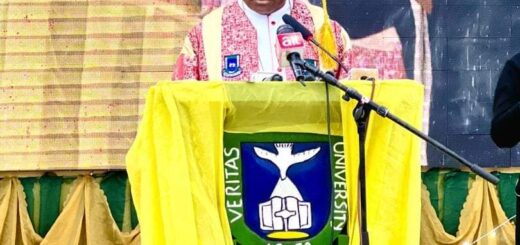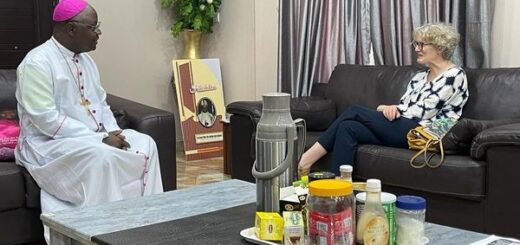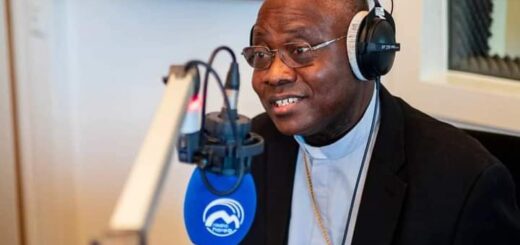Corporal Works of Mercy: Feed the Hungry
by ARCH BISHOP · March 9, 2021
Reflection by Archbishop i. A. Kaigama at Bwari Deanery Cathedraticum, St. Matthews Parish, Ushafa, Abuja, March 9, 2021
Readings: Daniel 3 : 25, 34-43, Psalm 24 : 4-5ab, 6 and 7bc, 8-9, Matthew 18 : 21-35
This Cathedraticum avails us another opportunity to meet again to celebrate our communion as members of the same family of the Archdiocese of Abuja. Your presence here this morning is an expression of your love and solidarity, which is very helpful for my work as your Archbishop. On behalf of my brother Bishop Anselm Umoren, the Auxiliary Bishop and the Emeritus Archbishop, John Cardinal Onaiyekan, I wish to thank you for your generosity, goodwill and sacrifices.
During last years cathedraticum Masses, I focused on the beatitudes. This year, I have chosen to reflect on the seven corporal works of mercy. Being the first deanery to host the Cathedraticum this year, I will dwell on the first corporal works of mercy to feed the hungry.
The corporal works of mercy (cf. Mt 25:31-46) teach us to treat our brothers and sisters, as if they were Christ and to respond to their needs. The corporal works of mercy are not optional but are absolutely essential to living the Christian life of holiness and goodness (Catechism of the Catholic Church, 2447).
We still have many internally displaced persons (IDPs) in IDP Camps, beggars on the streets, youths unemployed and restless, and pensioners languishing in poverty, etc. Our subsistent farmers cannot go to their farms due to fear of attack by gunmen who in recent times have driven them out and taken over their farms and homes. The lack of sincere efforts in fighting the menace of insecurity has aggravated the situation of hunger and poverty; hence, we need to increase our support to the poor, which explains why we launched the Lenten campaign, distributed Lenten boxes, and requested all parishioners to take up the various Lenten collections to support our poor and needy.
That there are many people in our country as in other parts of the world that go without food is no news. However, that we have earned the sobriquet as the poverty capital of the world should worry us. A combination of the COVID-19 pandemic related factors, conflicts and unemployment are worsening our poverty levels. With more than 80 million Nigerians said to be living in extreme poverty and suffering the consequences of food insecurity, even despite our fertile land and enormous material resources is due to lack of political will and economic foresight at all levels.
To worsen matters, bandits, kidnappers and terrorists have taken over the forests and farm lands, and people cannot freely engage in farming and other agricultural activities as in the past. The newly appointed security service chiefs must creatively confront the issue of insecurity to provide us with an environment conducive for the masses to cope with our current economic realities, particularly in the rural areas.
Feeding the hungry is an ethical imperative. In his Encyclical Caritas in Veritatis, Benedict XVI teaches that the right to food, like the right to water, has an important place within the pursuit of other rights… without distinction or discrimination (n. 27). The first World Day of the Poor, instituted by Pope Francis and first observed on 19 November, 2017, urges all to love the poor, not with words but with deeds May I humbly add that giving food to the poor is a powerful form of prayer.
St. James, in encouraging us to care for the needs of others says, If a brother or sister is poorly clothed and lacking in daily food, and one of you says to them, Go in peace, be warmed and filled, without giving them the things needed for the body, what good is that? (Jas. 2:15-16). Jesus says to us like He said to the disciples, the hungry and poor need not go away; you give them something to eat (Mt. 14:16). We must avoid the culture of food wastage where much of the food is thrown away or the produce of farmers rot away due to the absence of proper storage facilities.
READINGS OF THE DAY
The readings today focus on the mercy, love and benevolence of God who listens to the prayers and pleading of His people. In our first reading, God heard the prayers of Azariah and the other friends of Daniel who were condemned by King Nebuchadnezzar to be burnt to death in the blazing furnace. They cried out to God to have mercy, and the Lord sent His angel to safeguard them to the astonishment of the king and all those who witnessed the miracle.
The Gospel reading narrates the parable of the ungrateful servant who, having enjoyed an incredible debt cancellation from his master could be so unforgiving to his fellow servant of a small amount. We owe God a debt we could never repay, only if we do good to our neighbours, can we attract God’s mercy. The recent attempt to starve a section of the country of food produce is not only inhuman but depicts the attitude of the servant who refused to forgive after having enjoyed mercy.
CATHEDRATICUM
Cathedraticum comes from the same root that gives the word, cathedral”, the Bishop’s Church and cathedra meaning chair or seat. Cathedraticum refers to the amount of money to be contributed annually for the support of the Bishop, as a mark of honour and loyalty to the Cathedral Church. The 1983 revised Code of Canon Law prefers to describe it as a “tax” for the needs of the diocese (cf. Canon 1263).
Since the 6th century, it became customary in the life of the Catholic Church that once every year, Catholic faithful gather as a family to concretize their heartfelt gratitude to their Bishop. This is done to support the Bishop in his enormous pastoral assignments and to showcase their solidarity, faithfulness, obedience and to reaffirm their humble commitment to the teaching authority and leadership of the Bishop as chief steward and overseer of the diocese. For us, it is also a significant ceremony where the faithful gather according to Deaneries to express their closeness with the Chief Shepherd, to pray with and for him and to encourage him.
The funds and material support donated to the Bishop do not become his personal gifts; they are used to serve the good of the entire diocese, to help alleviate the sufferings of the poor and needy, to support other pastoral projects and to meet various needs in the diocese.
The Bishop also hands something over to stewards beyond the diocese, for service to the universal Church. Dioceses also make contributions to their National Episcopal Conferences, in our case, the Catholic Bishops Conference of Nigeria, the Reunion of the Episcopal Conferences of West Africa (RECOWA), the Symposium of Episcopal Conferences of Africa and Madagascar (SECAM), and even offer a gift to the Apostolic See (cf. Canon 1271), apart from other Pontifical Mission Societies (PMS) collections.
I wish to conclude by thanking the Dean of Bwari Deanery, Fr. Solomon Uko and all those who worked tirelessly to plan this Cathedraticum. I also thank Fr. Stephen Omale and St. Matthews parish, Ushafa, for accepting to host this event. Thank you, dear beloved parishioners of Bwari Deanery. God bless you all very richly.




